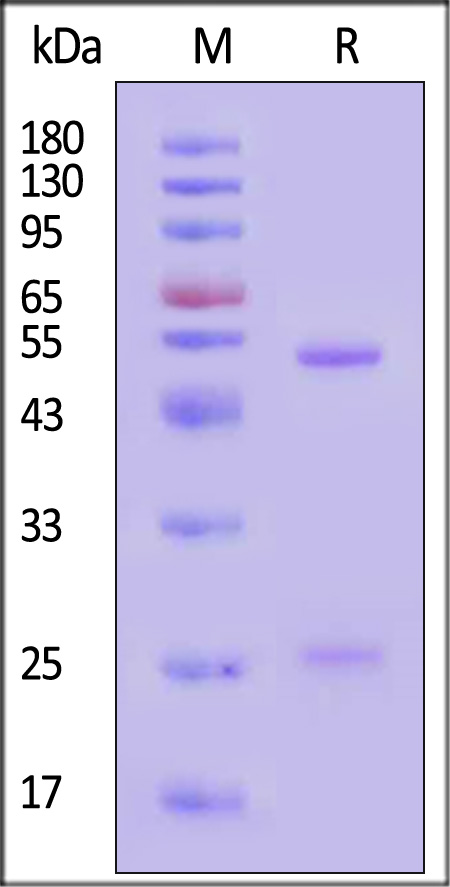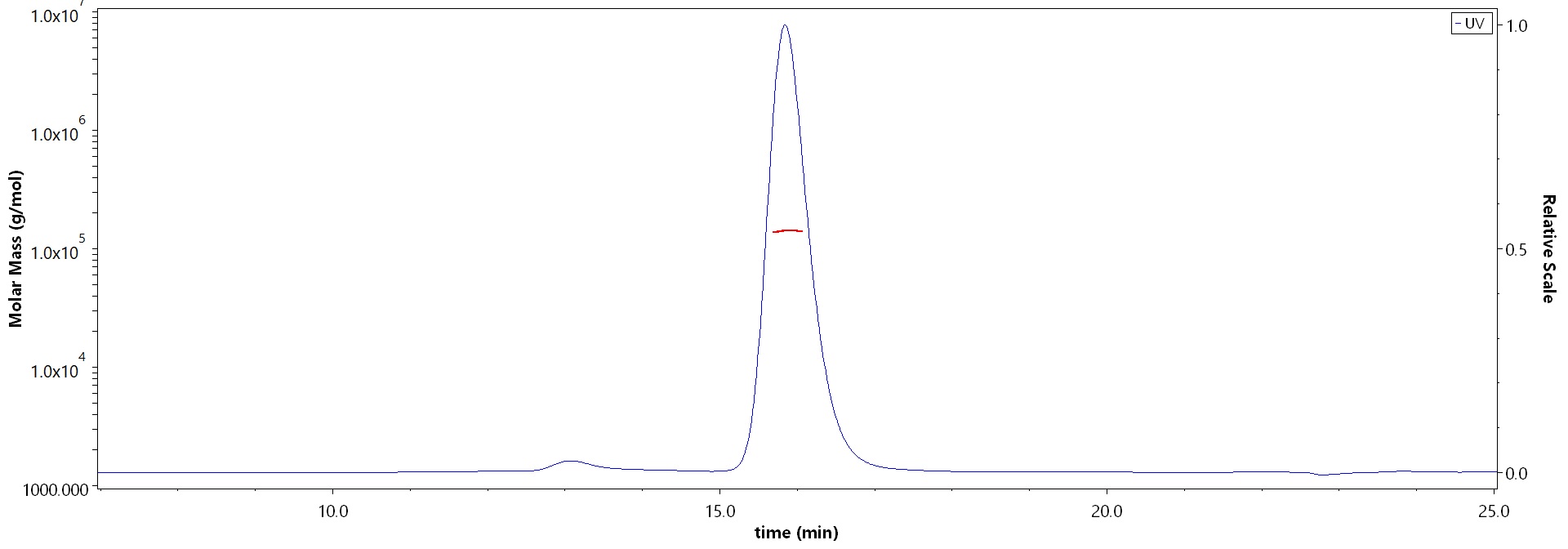抗体来源(Source)
Rituximab biosimilar is a chimeric monoclonal antibody recombinantly expressed from HEK293, which combines the variable region of a mouse monoclonal antibody with Human constant domain.
亚型(Isotype)
Human IgG1 | Human Kappa
抗体类型(Antibody Type)
Recombinant Monoclonal
种属反应性(Reactivity)
Human
免疫原(Immunogen)
CD20.
特异性(Specificity)
Rituximab is a genetically engineered chimeric murine / human monoclonal IgG1 kappa antibody directed against the CD20 antigen.
应用(Application)
| Application | Recommended Usage |
| ELISA | 0.2-39 ng/mL |
纯度(Purity)
>95% as determined by SDS-PAGE.
>95% as determined by SEC-MALS.
纯化(Purification)
Protein A purified / Protein G purified
制剂(Formulation)
Lyophilized from 0.22 μm filtered solution in PBS, pH7.4 with trehalose as protectant.
Contact us for customized product form or formulation.
重构方法(Reconstitution)
Please see Certificate of Analysis for specific instructions.
For best performance, we strongly recommend you to follow the reconstitution protocol provided in the CoA.
存储(Storage)
For long term storage, the product should be stored at lyophilized state at -20°C or lower.
Please avoid repeated freeze-thaw cycles.
This product is stable after storage at:
- -20°C to -70°C for 12 months in lyophilized state;
- -70°C for 6 months under sterile conditions after reconstitution.
电泳(SDS-PAGE)

Rituximab biosimilar on SDS-PAGE under reducing (R) condition. The gel was stained with Coomassie Blue. The purity of the protein is greater than 95% (With Star Ribbon Pre-stained Protein Marker).
SEC-MALS

The purity of Rituximab biosimilar (Cat. No. CD0-M36) is more than 95% and the molecular weight of this protein is around 135-160 kDa verified by SEC-MALS.
Report
活性(Bioactivity)-ELISA

Immobilized Rituximab biosimilar (Cat. No. CD0-M36) at 2 μg/mL (100 μL/well) can bind Human CD20 Full Length Protein, His Tag (Cat. No. CD0-H52H3) with a linear range of 0.2-10 ng/mL (QC tested).
Protocol
背景(Background)
B-lymphocyte antigen CD20 is also known as B-lymphocyte surface antigen B1, Leukocyte surface antigen Leu-16, Membrane-spanning 4-domains subfamily A member 1 and MS4A1, is an activated-glycosylated phosphoprotein expressed on the surface of all B-cells beginning at the pro-B phase (CD45R+, CD117+) and progressively increasing in concentration until maturity. CD20 is expressed on all stages of B cell development except the first and last; it is present from late pro-B cells through memory cells, but not on either early pro-B cells or plasma blasts and plasma cells. It is found on B-cell lymphomas, hairy cell leukemia, B-cell chronic lymphocytic leukemia, and melanoma cancer stem cells. The protein has no known natural ligand and its function is to enable optimal B-cell immune response, specifically against T-independent antigens. It is suspected that it acts as a calcium channel in the cell membrane. CD20 / MS4A1 is the target of the monoclonal antibodies (mAb) rituximab, Ibritumomab tiuxetan, and tositumomab, which are all active agents in the treatment of all B cell lymphomas and leukemias. Defects in CD20 / MS4A1 are the cause of immunodeficiency common variable type 5 (CVID5); also called antibody deficiency due to CD20 defect. CVID5 is a primary immunodeficiency characterized by antibody deficiency, hypogammaglobulinemia, recurrent bacterial infections and an inability to mount an antibody response to antigen.























































 膜杰作
膜杰作 Star Staining
Star Staining











